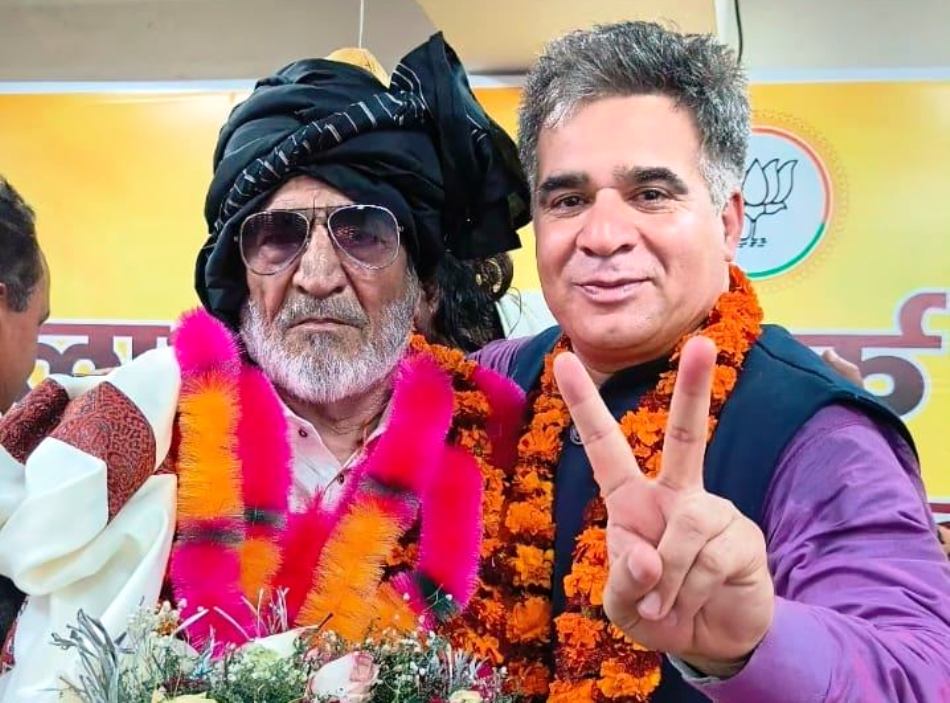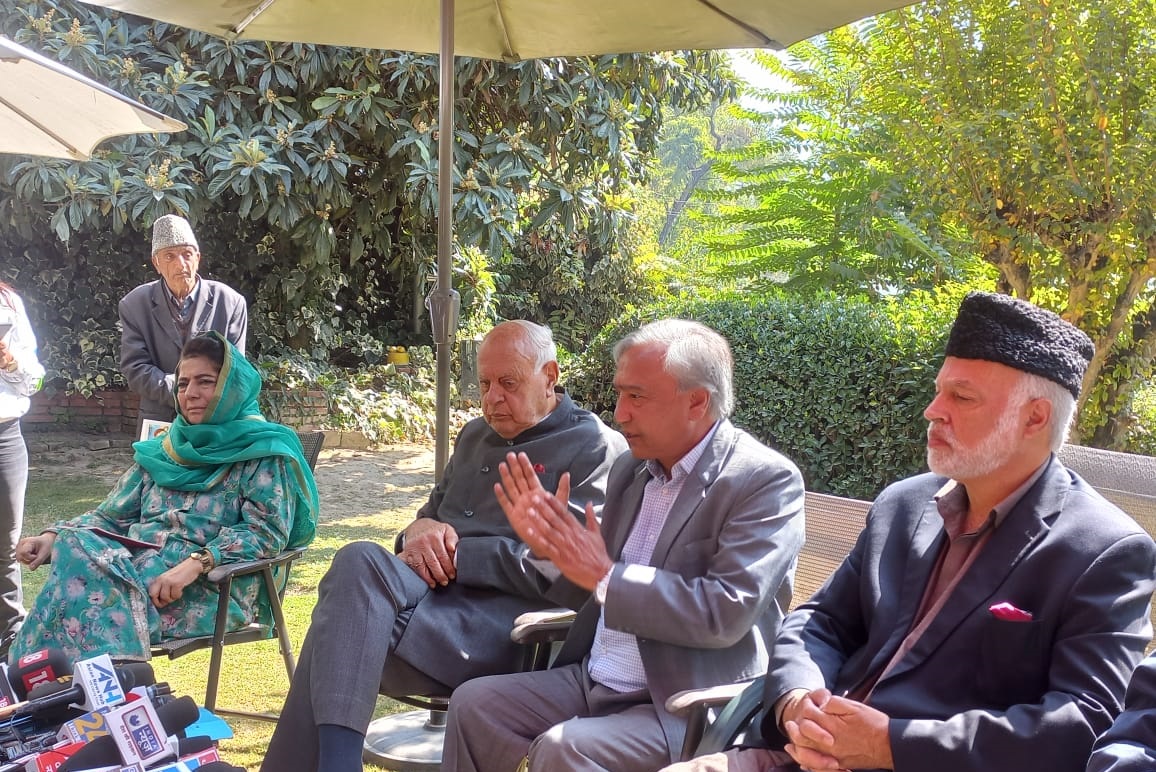With JKNC insisting they will have no talks on any kind of seat sharing in Kashmir – where it retains all the three Lok Sabha segments, a sulking JKPDP is likely to throw its hat in the ring. What will it mean to PAGD, mandate and elections, Sajid Raina reports
With the general elections round the corner, ambiguity surrounds the seat-sharing agreement of the Opposition INDIA (Indian National Developmental Inclusive Alliance –a large political alliance in India consisting of 27 political parties as of February 16, 2024) alliance in Jammu and Kashmir and Ladakh. Since most of the parties in Jammu and Kashmir, excluding the BJP and its allies, are in a loose alliance called the People’s Alliance on Gupkar Declaration (PAGD), the elusive seat-sharing puts a huge question mark on its existence as well.
The Track is Open
On February 15, JKNC president Dr Farooq Abdullah stated that his party would not engage in a pre-poll alliance for the upcoming Lok Sabha elections. “As far as seat sharing is concerned, I want to make it clear that NC won’t go for pre-poll alliance ahead of Parliamentary elections,” he told reporters at Nawa-e-Subh Srinagar. “There is no second thought in it.”
Shortly after, his son and former chief minister, Omar Abdullah, reiterated this stance, declaring that there was no possibility of an alliance with the BJP-led National Democratic Alliance (NDA). “No door or window or even track is open for alliance with NDA.”
Omar indicated that discussions regarding three parliamentary seats, including two in Jammu and one in Ladakh, would soon commence with the INDIA bloc. “Our primary objective in contesting the parliamentary elections is to regain our seats from the BJP. In the assembly elections, our goal will be to secure a substantial number of seats, enabling us to address the damage inflicted on Jammu and Kashmir since 2019,” he articulated. “To rectify this damage, we cannot align with the NDA. When the assembly elections approach, our entire campaign will focus on holding the BJP accountable for their actions in Jammu and Kashmir.”
Asserting that the INDIA Alliance already holds three seats, including Srinagar, Anantnag, and Baramulla, the seat-sharing discussions must focus on the remaining three that are with the BJP. There will be no discussion on the three seats of Kashmir as these seats are already with the INDIA alliance.
A Silent PDP
Top leaders in the JKPDP have been talking loudly against the JKNC over the past few months. They were talking about the “other parties” getting “preferential treatment” unlike JKPDP and, unlike others, JKPDP was disintegrated. These public accusations led an angry Omar Abdullah to talk publicly many times. However, every time, there were tensions, Dr Farooq Abdullah doused the flames.
This time, when the JKNC is clear in its stand that there will not be any seat sharing on the three segments in Kashmir, JKPDP is silent.
“We have not yet finalised its candidates for the forthcoming Lok Sabha elections,” party spokesman, Mohit Bhan said. He asserted that a comprehensive meeting will be convened in the coming weeks to discuss various aspects, including whether the party will support an alliance or not. The decision regarding the party’s stance on alliance participation will become clearer following this meeting.
However, rumours are already around about who is going to get a mandate from which segment. Formally, the decision-making may take some more time. There are reports that JKPDP may like the south Kashmir Anantnag seat to be left for them and the JKNC could contest from the balance of two seats. This suggestion, however, is informally in circulation.
JKNC Chief Spokesperson, Tanvir Sadiq, has indicated that the party’s top leadership has devised its strategy for the Lok Sabha polls. He noted that the selection of candidates is still pending. Asked about the stance of the PAGD regarding the elections, Sadiq clarified that the Gupkar Alliance served a distinct purpose and is not directly linked to elections.
Kashmir In Spotlight
These announcements put the spotlight on Kashmir seats, which are currently represented by Dr Farooq Abdullah (Srinagar), Husnain Masoodi (Anantnag) and Mohammad Akbar Lone (Baramulla). The three segments were with Jammu and Kashmir Peoples Democratic Party (PDP) in the last Lok Sabha.
The table talk that is consuming the political class is that if NC retains all three segments, what will happen to the JKPDP? If the two major Kashmir parties contest against each other, will not that essentially mean that PAGD is dead? Given the history of elections, if the two parties fight against each other, will not the split give a clear advantage to a third party?
These are questions that are likely to dominate the political discourse in the coming days. However, the decision to go to hustings on their strength will make the elections interesting. The two parties will not be fighting each other alone, they will be in contest with Altaf Bukhari’s Apni Party and Sajad Lone, Peoples Conference as well. However, the peculiar Lok Sabha constituency of so-called Anantnag (now having Poonch and Rajouri as well) is interesting, if not historic.
The Pir Panchal Segment
The Lok Sabha segment of Anantnag-Rajouri exists on the two sides of the Pir Panchal foothills with no surface communication link. It involves two faiths and three ethnicities. It has four assembly seats from Rajouri, three from Poonch, seven from Anantnag district, three from Kulgam and one from Shopian district. Out of 18 assembly segments falling in this constituency six are ST reserved.
However, what makes this constituency distinctly interesting is that the Pir Panchal valley is caught in its own tensions over the ST status. It is going to be Gujjar versus Pahari electorate.
On this side of the mountain, it will be JKNC versus JKPDP versus Apni Party versus BJP. This will make the belt quite explosive.

Exposing the Twin Parties
While the JKNC and JKPDP might be key claimants to the political class in Kashmir, the Vale politics has never been short of surprises. For the last many years, Sajjad Lone and Altaf Bukhari have been very active. Even the BJP has been managing some of its shows well. They may not be the key claimants to either of these seats but they have the potential of using the Lok Sabha elections to ‘resize’ the image of the two main Kashmir parties so that they harvest its benefit in the subsequent assembly elections.
“We have seen there are already three members from Kashmir who represent Jammu and Kashmir, but it is sad that what they did till now? Article 370 and 35(A) were taken away in their presence and they failed to resist. Just three members out of 500 can do nothing,” Bukhari said in Jammu. “Assembly elections have a major role in safeguarding and protecting interests of the people of Jammu and Kashmir so they are more important.”
The focus of the campaign is expected to be the formal and informal relations of the parties with the BJP, the biggest political force in the country.
JKPDP has been in alliance with the BJP till the latter moved out of the coalition and plunged Jammu and Kashmir into a crisis in 2018. Everything changed in the subsequent years. In this context, Omar Abdullah said late last year, “I am sorry that in 2009 when we had extended the hand of friendship with PDP to stop BJP, at that time our hand was rejected.” This will echo in the campaign now.
JKNC will face its own history. “Before PDP, it was NC that wanted to align with BJP in 2014,” Mattu, an erstwhile Omar Abdullah aide, recently tweeted, when his Apni Party was termed B-team of BJP by JKNC. He said Omar Abdullah personally engaged in discussions expressing his willingness to become the Chief Minister in a potential NC-BJP alliance.

Mattu claimed that when the BJP offered the deputy Chief Minister (DyCM) post to JKNC, Ali Mohamad Sagar (AMS) was enthusiastic. “There was another DyCM aspirant from NC in Jammu but both CM and DyCM from Jammu wasn’t thought feasible,” one of the tweets said. “This — as expected — made the Abdullahs anxious. Like Late Mohiuddin Shah — AMS was seen by the family as a potential usurper.”
Omar’s other aide and close friend Devinder Singh Rana, now a senior leader in the BJP, is adding to this consistently. “In 2014, Omar Abdullah had approached the BJP to join hands in forming a government, but the offer was turned down,” Devinder Singh Rana said in Jammu. “In 2017, after the demise of Mufti Mohammad Sayeed, Farooq Abdullah openly expressed his willingness to form a government with the BJP. The BJP declined the offer.”
Singh said in 2014, it was Omar personally leading the negotiations and he (Rana) was personally part of it. The 2017 offer was made by Dr Abdullah in Katra and it was made publicly, he said. “I can confidently say that numerous attempts were made, even after the abrogation of Article 370, to establish some form of strategic partnership or understanding with the BJP, as I was part of the National Conference system.”
At a personal level, Sajad Lone is very well-informed. He was one of the many people who contributed to the making of PAGD and knows things inside out. He is a firm believer that the 1987 assembly elections were the major negative contribution in pushing Kashmir to chaos and for that, everybody knows where the blame goes.
All these issues are likely to be talked loudly from huge podiums with added information this spring. How will this discourse impact the subsequent assembly election remains to be seen.















